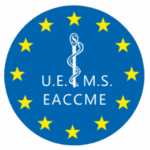




Pre-Congress-Day
EDA Annual Conference 2025 - 12. November
Welcome
to the Pre-Congress-Day
| Time | Subject | Speaker |
|---|---|---|
| 9:00 | Begrüßung und Eröffnung |
Prof. Dr. Leiv Otto Watne, Oslo |
Sitzung 1
Vom Willen zur Umsetzung: Delirmanagement zwischen Ethik, System und Politik
Vorsitz: Dr. Cynthia Olotu, Hamburg
| Time | Subject | Speaker |
|---|---|---|
| 9:05-9:30 | Ethischen Dilemmata und Willensbildung im Delir |
PD Dr. Christine Thomas, Stuttgart |
| 9:30-9:55 | Macht Delir zu einem politischen Thema! Bericht über eine Petition an den Deutschen Bundestag |
PD Dr. Peter Nydahl, Kiel |
| 9:55-10:20 | Delirmanagement – einfach zu kompliziert für unser Gesundheitswesen? |
Dr. Simone Gurlit, Münster |
| 10:20-10:35 | Pause / Break |
Sitzung 2
Delirmanagement heute: Von Konzepten und Verträgen zur gelebten Praxis
Vorsitz: Dr. Wibke Brenneisen, Münster
| Time | Subject | Speaker |
|---|---|---|
| 10:35-11:00 | AltersTraumaZentren: Delir im Fokus |
Dr. Carla Stenmanns, Düsseldorf |
| 11:00-11:25 | „Der alte Mensch im OP“ – 20 Jahre Delirprävention |
Dr. Wibke Brenneisen, Münster |
| 11:25-11:55 | Qualitätsverträge: Wege in die Umsetzung |
Dr. Astrid Bergmann, Bad Oeynhausen |
| 11:55-12:45 | Pause / Break |
Sitzung 3
Und dann kommt der Alltag: Perspektiven auf ein komplexes System
Vorsitz: PD Dr. Peter Nydahl, Kiel
| Time | Subject | Speaker |
|---|---|---|
| 12:45-13:05 | Angehörige – Hilfreich auf der Intensivstation? |
Piet Tohsche, Hamburg |
| 13:05-13:30 | Delir bei Demenz – Henne und Ei? |
Prof. Dr. Claudia Eckstein, Ludwigsburg |
| 13:30-13:55 | Delirprädiktion – wie, wann und warum überhaupt? |
Prof. Dr. Maria Wittmann, Bonn |
| 13:55-14:15 | Pause / Break |
Sitzung 4
Von Mobilisation, Medikation und Sprache: Ganzheitliche Ansätze zur Delirprävention
Vorsitz: PD Dr. Christine Thomas
| Time | Subject | Speaker |
|---|---|---|
| 14:15-14:40 | Mobilisation: Dreh- und Angelpunkt effektiver Delirprävention |
Silke Filipovic, Wolfsburg |
| 14:40-15:05 | Schmerz macht Delir, Opioide auch – Herausforderungen guter Medikation im Alter |
Dr. Christian Schöps, Hamburg |
| 15:05-15:30 | Mobilisation und Sprache im Delir |
Anemone Neumann-Wagner, Lübeck |
| 15:30-15:50 | Pause / Break |
Sitzung 5
Herausforderung angenommen: Erfolgsmodelle zur Delirprävention aus der Pflegewissenschaft
Vorsitz: Carsten Hermes, Berlin
| Time | Subject | Speaker |
|---|---|---|
| 15:50-16:15 | Ein APN geleitetes, multimodales Schulungskonzept zum Delir Management auf Intensivstationen |
Nina Tonner, Salzburg |
| 16:15-16:40 | DIAMANT - Delirprävention und -behandlung auf Intensivstationen durch APN mit Angehörigen und Team |
Linda Göttsche, Kiel |
| 16:40-17:05 | Delir auf der Intensivstation: Schulungsbedarfe und Herausforderungen für das Behandlungsteam |
Marion Diegelmann, Fulda |
Seminarraum 1
Workshop
| Time | Subject | Speaker |
|---|---|---|
| 12:45-15:30 | „Delir-Parcours“ |
Carsten Hermes, Berlin |
Seminarraum 2
Workshop
| Time | Subject | Speaker |
|---|---|---|
| 12:45-15:30 | „Mini-EEG-Boot Camp“ |
PD Dr. Finn Radke, Nyköping, Denmark |
Panorama-Saal
Pathophysiology Symposium
Chair: Prof. Dr. Colm Cunningham, Dublin
| Time | Subject | Speaker |
|---|---|---|
| 11:00-11:05 | Welcome & Introduction |
Colm Cunningham, Trinity College Dublin |
| 11:05-11:35 | Ketone bodies mitigate against systemic inflammation-induced changes in brain energy metabolism and delirium-like deficits in aged mice |
Colm Cunningham, Trinity College Dublin |
| 11:35-12:00 | TNF-a has disproportrionate metabolic, inflammatory and cognitive consequences in aged mice |
Javier Cuitavi, Trinity College Dublin |
| 12:00-12:30 | Network disruption in delirium |
Gideon Caplan, University of New South Wales |
| 12:30-13:10 | Break |
|
| 13:10-13:15 | The neurophysiology of delirium - an overview of EEG measures |
Ophelia Dunne, University College London |
| 13:15-13:30 | Technical aspects of obtaining EEG in unselected acute medical patients |
Amy McWhirter, University College London |
| 13:30-14:00 | Variation in quantitative EEG by delirium and acute illness status |
Patrick Hogan, University College London |
| 14:00-14:20 | Break |
|
| 14:20-14:50 | Network Instability: A Translational Perspective on delirium pathophysiology |
Eyal Kimchi, Northwestern University, Chicago |
| 14:50-15:20 | Age related differences in neural function in response to acute infection |
Fiona Harrison, Vanderbilt University Medical Center, Nashville |
| 15:20-15:40 | Break |
|
| 15:40-16:10 | Effects of complement in sepsis-associated encephalopathy |
Christian Geis, Jena University Hospital |
| 16:10-16:40 | Bazedoxifene, an Estrogen Receptor Modulator and IL-6 Trans-Signaling Inhibitor, Ameliorates Delirium-like Phenotypes in Mice |
Shouri Lahiri, Cedars-Sinai Health Sciences University, Los Angeles |
| 16:40-17:05 | Discussion |






